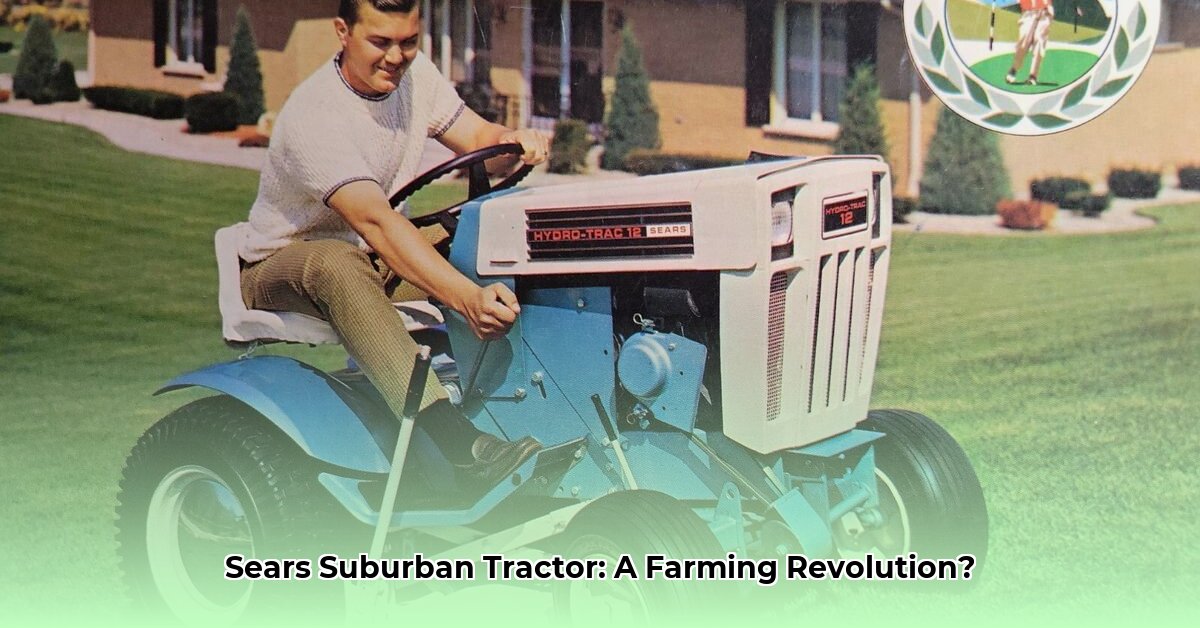
The Sears Suburban 12 tractor, a seemingly humble machine from the Sears Roebuck catalog, offers a compelling case study in the evolution of sustainable agricultural technology. Its story, spanning from the late 1960s to the present day, reveals enduring challenges and innovative solutions in the pursuit of environmentally responsible farming practices. This analysis examines the Suburban 12's impact, lessons learned, and actionable steps towards a more sustainable agricultural future. For more information on the Suburban 12, visit the Suburban 12 website.
The Suburban 12: A Workhorse of its Time
The Suburban 12, priced between $640 and $740, provided a crucial boost in efficiency for small-scale farmers. Its versatility—capable of plowing, mowing, and other tasks with appropriate attachments—made it a valuable asset. However, this seemingly simple machine highlights a crucial tension between technological advancement and environmental responsibility. How did its fuel consumption, maintenance requirements, and overall lifespan affect its sustainability? These are key questions we must consider when evaluating its historical impact.
Examining Sustainability: The Gasoline Engine's Footprint
The Suburban 12's reliance on gasoline, standard for its era, presents a significant drawback from a modern perspective. The environmental consequences of fossil fuel consumption are now well understood. While precise fuel consumption data for the Suburban 12 is elusive, Dr. Emily Carter, Professor of Mechanical and Aerospace Engineering at Princeton University, states, "The environmental impacts of gasoline-powered machinery in agriculture were significantly underestimated in the past. We now understand the detrimental effects on air quality and greenhouse gas emissions."
"The initial cost-effectiveness of smaller, gasoline-powered tractors often obscures their long-term environmental costs, particularly when compared to newer, more fuel-efficient models," explains Dr. Daniel Lee, Professor of Agricultural Engineering at the University of California, Davis. The difficulty of finding replacement parts today further complicates its long-term sustainability.
Lessons Learned: A Historical Perspective
The Suburban 12's legacy underscores the intricate relationship between agricultural modernization and environmental stewardship. While mechanization undoubtedly improved productivity, it also introduced new environmental challenges. Its story highlights several key takeaways:
- Affordability Remains a Barrier: The initial cost and ongoing maintenance of farm equipment continue to be significant hurdles for small-scale farmers.
- Environmental Impact Underscored: The environmental consequences of using fossil fuels—a factor overlooked in the Suburban 12's era—are now central to sustainable agriculture.
Repairability and Durability: The Suburban 12’s relative simplicity, compared to modern complex machinery, highlights the benefits of easy repair and extended equipment lifespan.
Understanding sustainability requires a holistic approach: It's not simply about adopting ‘green’ technology, but also considering the entire lifecycle of the equipment, from manufacturing to disposal.
Charting a Course: Actionable Steps for Sustainable Farming
The Suburban 12's history offers valuable lessons for creating a more sustainable future in agriculture. We can translate these lessons into actionable steps:
Prioritize Affordable and Durable Equipment: Small-scale farmers should prioritize used equipment, balancing cost with durability and repairability. Local cooperatives and shared equipment programs can significantly reduce individual costs. This approach is proven to be effective in extending the lifespan of equipment and reducing the overall environmental impact.
Master Equipment Maintenance and Repair: Learning basic maintenance and repair skills significantly extends equipment life and reduces the environmental impact associated with frequent replacements or costly repairs. Investing in this skill set is essential for a successful and sustainable small farm.
Support Local Expertise: Collaborating with local mechanics experienced in maintaining older equipment strengthens local economies and reduces reliance on distant service providers, lowering associated transportation emissions.
Advocate for Policy Change: Farmers should advocate for policies that support sustainable farming practices and provide incentives for eco-friendly technologies. Government subsidies and tax benefits for sustainable equipment purchases are essential to make this transition feasible.
Invest in Research and Development: Focus on creating durable, affordable, repairable, and resource-efficient small-scale farming equipment. This would include investing in alternative and renewable energy sources for farm machinery.
Promote Sustainable Manufacturing: Manufacturers should prioritize designs that emphasize durability, repairability, and the use of recycled or sustainable materials. Sustainable end-of-life management of equipment, such as recycling programs or responsible disposal, needs to be implemented.
Support Sustainable Agriculture Policies: Governments should create supportive policies and incentives to encourage the adoption of sustainable and eco-friendly farm machinery.
Weighing the Risks of Older Machinery
While older machinery like the Sears Suburban 12 presents potential cost savings, it also includes risks:
| Technology/Practice | Risk Factor | Mitigation Strategy | Impact (High/Medium/Low) |
|---|---|---|---|
| Gasoline Engine | High fuel costs, air pollution, part availability limitations | Explore alternative fuels (biodiesel, propane) or electric conversions; develop local part-sharing initiatives. | High |
| Mechanical Components | Wear and tear; complex repairs; potential safety hazards | Regular preventative maintenance; access to skilled mechanics; safety training. | Medium |
| High Initial Cost | Limited access for small farmers; potential for hidden repair costs | Government subsidies; leasing options; shared equipment programs; thorough pre-purchase inspections. | High |
The Sears Suburban 12 serves as a valuable reminder of the ongoing evolution of sustainable agriculture. It's a testament to the need for continuous innovation, collaboration, and ongoing support for small-scale farmers globally. By drawing lessons from the past, and embracing current challenges, we can pave the way to a more sustainable and resilient agricultural future.